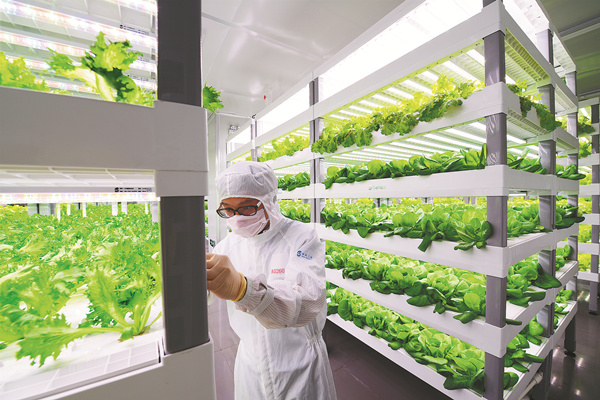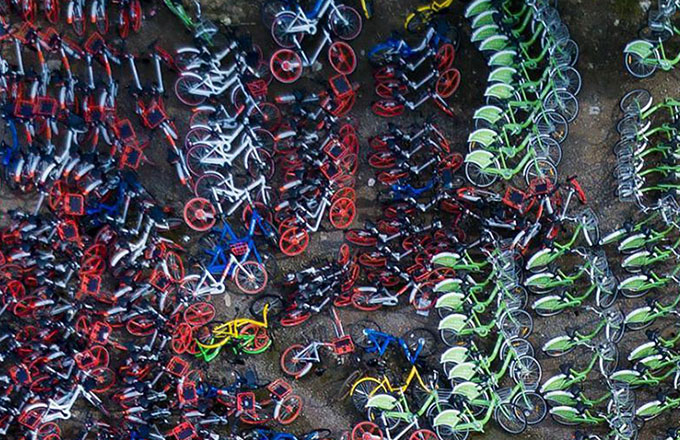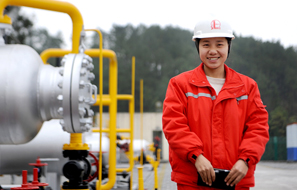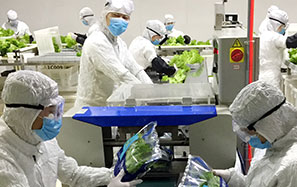Sustainable food production looking up
 |
|
A laboratory worker in biohazard gear checks the growth of lettuce in the vertical farm in Anxi, Fujian province. ZHAN ZHUO / FOR CHINA DAILY |
A laboratory worker in full biohazard gear is patrolling rows of rainbow colored LED-lit shelves. The shelves stand about 2 meters and have six levels, each containing trays of lettuce saplings bathing underneath the light, and the room is illuminated in a psychedelic pink.
This is no scene from a science fiction movie, but a common sight for scientists at a plant factory in Anxi, Fujian province, which covers 1 hectare and is the largest vertical farming complex in the world. The second-largest is a 0.64 hectare farm in Newark, New Jersey.
Vertical farming is the practice of growing vegetables and fruits in vertically stacked layers of hydroponic solutions in a controlled, indoor environment. It does not require soil, sun or pesticides, and uses far less water and fertilizer than conventional farms.
However, the farm's high-energy cost has greatly limited its scale and profitability. In recent years, Chinese scientists at the Anxi plant factory have mitigated the issue by inventing energy efficient LEDs and recyclable hydroponic solutions, as well as new energy-conserving methods to maximize a plant's growth potential.
San'an Sino-Science, the company behind the project, says these new methods have cut the factory's overall energy consumption by 25 percent compared with its first facility.
"We hope to cut more energy so vertical farming can become a viable way to feed our population without polluting and straining our already scarce water and soil resources," the factory's executive manager, Zhan Zhuo, said.
"The technology would also allow astronauts, aircraft carrier personnel, and frontier guards on islands or in deserts to grow fresh produce in impossible conditions to fill their daily vitamin and fiber needs.”
China has 160 million hectares of farmland dedicated to growing vegetables. To grow them, farmers use more than 311,000 metric tons of pesticide and 59 million tons of fertilizer a year, said Li Shaohua, director of San'an Sino-Science's Photobiology Industry Institute.
"The excessive yet inefficient use of fertilizers and pesticides has done great harm to our environment," he said. "It's high time we find a sustainable and green way to protect our food security."
San'an Sino-Science was founded in 2015 by San'an Group and the Chinese Academy of Sciences' Institute of Botany. The second-generation plant in Anxi can produce 1.5 tons of vegetables, such as lettuce and cabbage, a day.
At full capacity, when the energy cost is neglected, it can produce 1,000 tons of leafy greens a year in theory, according to Li. "The high productivity is mainly because we try to emulate the most ideal natural conditions for plant growth, and use technologies to cater to their every needs."
Before entering the plant factory, visitors must put on a dual-layered jumpsuit, goggles, a face mask, rubber gloves and boots, and be disinfected from head to toe. Sneezing in the factory is strictly prohibited.
"The standard here is stricter than hospital operating rooms," said Zheng Yanhai, a botany researcher at the institute who works at the plant factory. "Because all the plants are growing in nutrient-filled hydroponic solutions, we do not want germs to get into the liquid and make plants sick."
Thanks to the clean environment, plants can grow without antiseptics or pesticides, "you can even eat it fresh out of the bag", Zheng added.

























